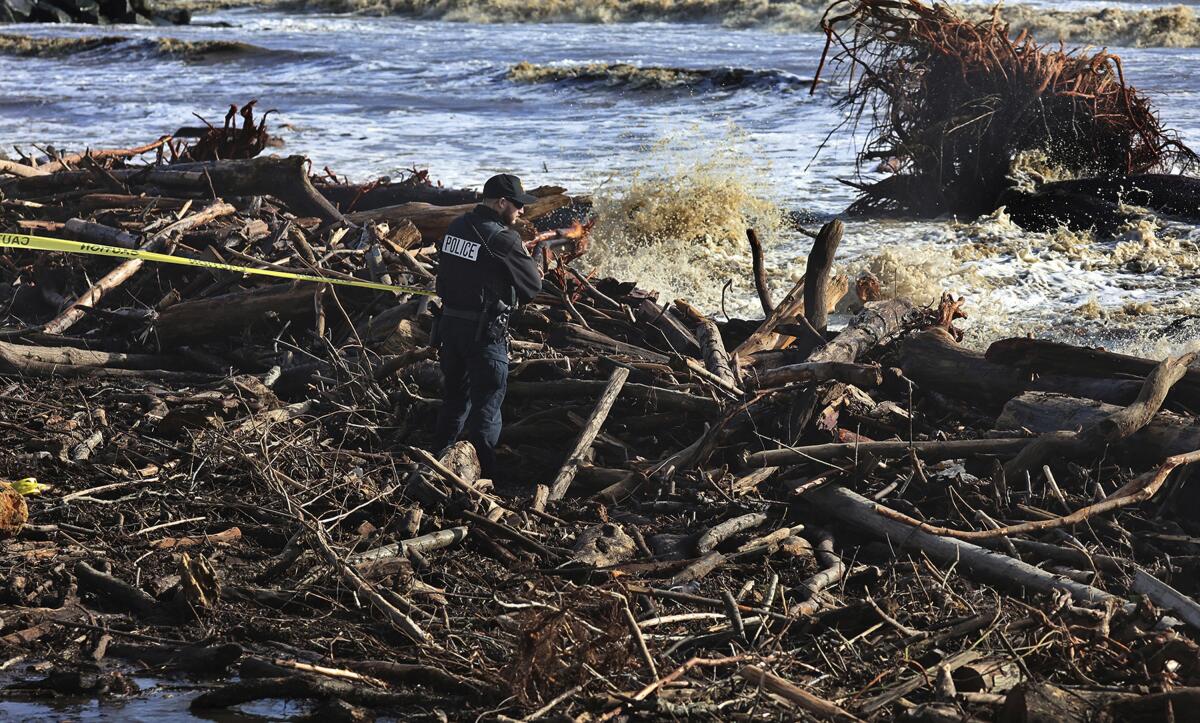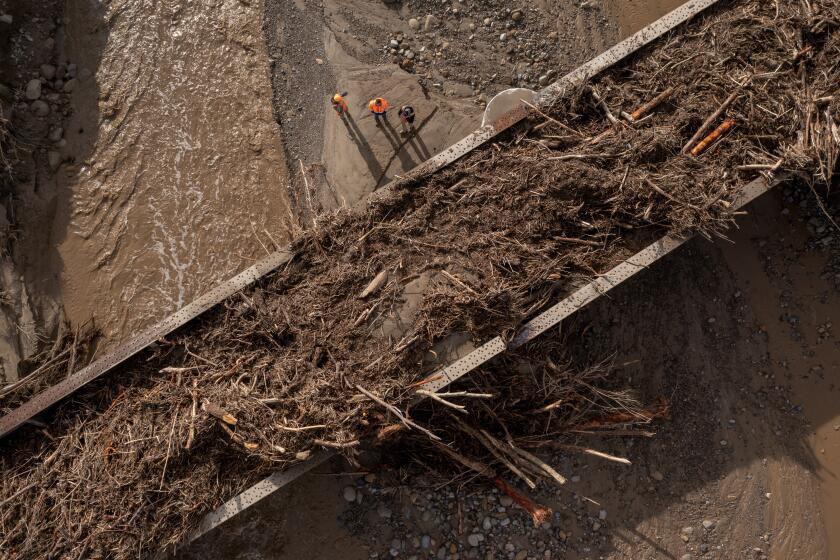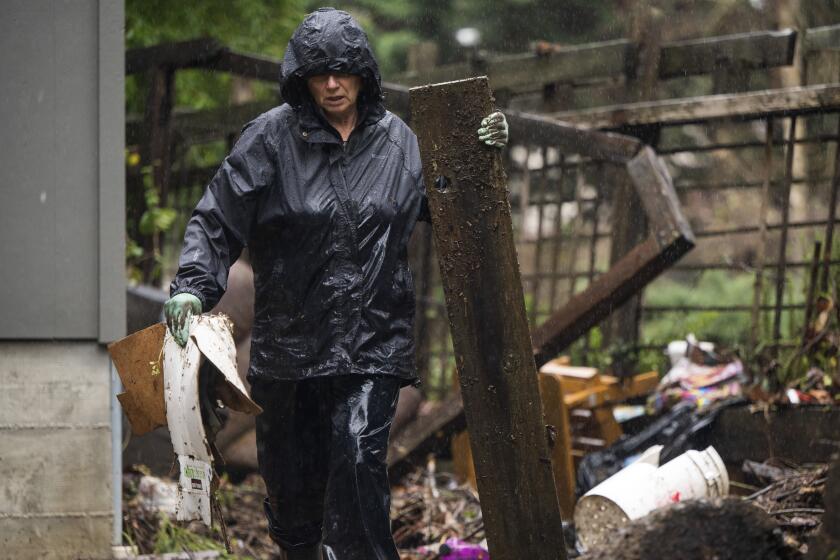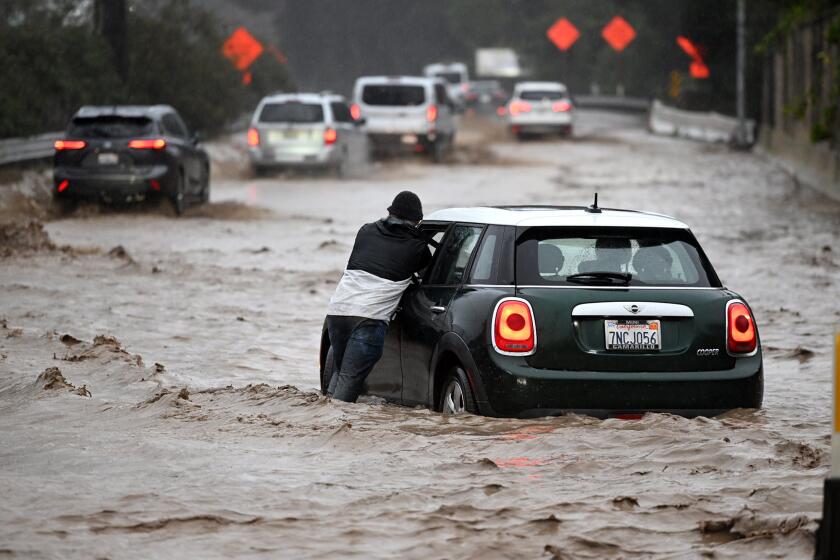New storms set to hit a rain-battered California, with Monterey Peninsula at serious risk

- Share via
SAN FRANCISCO — More storms were expected to hit Northern California and the rest of the state Friday, bringing fears of flooding, mudslides and power outages in communities already battered by a series of atmospheric rivers.
All eyes will be on Monterey County as officials warn that flooding could cut off the Monterey Peninsula from the rest of the state and shut down major roadways, including Highways 1 and 68.
With more storms on the way, the Salinas River region is forecast to receive 1 to 1.5 inches of rain Friday and up to 2 more inches over the weekend, according to the National Weather Service.
That could swell the river to one of the highest peak flood levels in its history.
The river is expected to reach flood stage, which is 23 feet, at the town of Spreckels at 10 p.m. Thursday and peak Friday, according to the California Nevada River Forecast Center. Officials are preparing for the river to be in continued flood stage through Sunday.
Many low-lying areas along the Salinas River valley in Monterey County, from the coast to Jolan Road, were under evacuation orders or warnings “until further notice.” Flooding could sever access between the Monterey Peninsula and areas north of it, including Salinas, the county’s most populous city, Santa Cruz County and the rest of the San Francisco Bay Area.
The powerful storm that knocked out power, toppled trees — including one that killed a toddler — and flooded homes along the coast in Santa Cruz continued its march through the region.
“Residents both on the peninsula and in the Salinas area should expect to be cut off for two to three days,” Monterey County officials said in a Wednesday statement.
Highway 68, River Road, Reservation Road, Blanco Road and other secondary roads are expected to be affected by flooding, and potentially Highway 1, officials said. Motorists have been advised not to attempt to cross roads when they see road closure signs.
Law enforcement officers have gone door to door to let residents know about the likely flooding, Monterey County Sheriff Tina Nieto said at a Thursday news conference.
The communities of Spreckels, Chualar and Las Palmas Ranch 1 and Las Palmas Ranch II could be cut off from central services due to flooding, Nieto said. If Highways 1 and 68 are blocked by floodwater, peninsula residents in Monterey, Carmel-by-the-Sea and Pacific Grove also won’t be able to leave the area.
“This is a slow-moving event,” she noted. “The river crests at different times.” Not all areas will be affected at once, she said.
The latest storm further swamps California, already reeling from widespread flooding, mudslides, washed-out roads and downed power lines.
At a Wednesday news conference, Nieto urged residents and businesses to prepare “for what could be the ‘Monterey Peninsula Island,’ as we call it.” She recalled the March 1995 floods, which resulted in the Salinas River cresting at a historic high of 30.29 feet, leaving the peninsula “an island and people were stuck on either one side or the other.”
If the Salinas River crests above 24 feet, low-lying agricultural land along the river will experience “significant flooding,” according to the National Weather Service. At 26 feet, lower areas of Spreckels, Soledad, Gonzales, Chualar and Spence could be flooded. At least 20,000 acres of farmland in the Salinas Valley are at risk of flooding; levees along the lower Salinas River also could be breached.
Dimas Lopez, manager of Sea Harvest Restaurant & Fish Market in Pacific Grove, said his restaurant had been stockpiling seafood and other products in anticipation of the flooding.
Lopez said his main supplier wouldn’t be delivering anything this weekend because of the weather. Amid his stockpiled seafood supplies, he’s mostly worried that the power could go out.
“I prepared ourselves pretty good,” he said. But “if we lose power, it’s going to be a problem.”
In nearby Monterey, resident Jeremy Sousa said he’d lost power four times at his apartment since New Year’s Eve — once for 19 hours. He’s worried the next storms could again leave him in the dark, and possibly stranded on the peninsula.
Sousa said he feared that “if one of the upcoming storms knocks out power while road access is cut off, it might be impossible for electrical crews to get here to restore power.” Right now, he said he was focused on stocking up on nonperishable food and keeping his phone charged.
All the latest coverage from the deadly storms that have hit the state.
Pacific Gas & Electric Co. officials said Thursday that the upcoming storms would produce “some elevated outages” but didn’t immediately respond to specific questions about where or how it was planning to deal with potential access issues in Monterey. The company said only that it was “well-positioned” for the upcoming weather.
Spots in the county’s evacuation shelters were still available Thursday afternoon, and many hotels along the peninsula were offering discounted rates for evacuees. More information can be found on the county’s 2023 winter storm website.
Throughout California on Thursday, cleanup and damage assessment continued after a series of deadly storms.
The death toll from the sudden and powerful storms rose Wednesday after Sonoma County sheriff’s officials announced a person had been found dead in a car submerged in 8 to 10 feet of water. The El Dorado County Sheriff’s Office also confirmed Wednesday that a 33-year-old man was found dead in the American River on Jan. 3, bringing the total of confirmed storm-related fatalities to 19.
A 5-year-old boy who was swept away by floodwaters in San Luis Obispo County on Monday was still missing Wednesday night as more than 100 members of the California National Guard joined the search effort.
The deadly toll from California storms grows to 18
Widespread flooding also forced the evacuation of Planada, a community of about 4,000 people just east of Merced. Though water levels have started to recede, the Merced County Sheriff’s Office said Wednesday morning that it was “unsafe to go back into flooded areas” and the evacuation order was still in place.
County Supervisor Rodrigo Espinosa said more than half the town, which is home to many farmworkers, was flooded. Officials were hoping to marshal government and nonprofit resources to get aid to people, he added, and were also working furiously to shore up the sewage plant in Planada so it didn’t send raw sewage into the already decimated community.
“It’s very sad,” he said. “We’re just trying to get help to residents.”
Santa Cruz County Supervisor Zach Friend characterized recent storms as “a once-in-a-generational challenging event” that had affected the whole county. Towns such as Capitola, Santa Cruz and Soquel were all hard hit.
“We know this is going to be a long rebuild. We know we’re going to need a lot of resources,” he said during a news conference Tuesday. “But what we also need is a sense of resilience from all of us to be able to rebuild this area — because we’ve seen the tears, we’ve seen the anger, but we’re moving into a resilience phase where we’re just trying to rebuild, bring that hope back.”
More to Read
Sign up for Essential California
The most important California stories and recommendations in your inbox every morning.
You may occasionally receive promotional content from the Los Angeles Times.
















